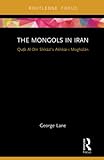The Mongols in Iran : Quṭb Al-Dīn Shīrāzī's Akhbār-i Moghulān / George Lane.
By: Lane, George [author.].
Material type: BookSeries: Routledge studies in the history of Iran and Turkey: Publisher: London ; New York, NY : Routledge/Taylor & Francis Group, 2018Description: vii, 127 pages : illustrations ; 23 cm.Content type: text Media type: unmediated Carrier type: volumeISBN: 9781138500525.Subject(s): Quṭb al-Shīrāzī, Maḥmūd ibn Masʻūd, 1236 or 1237-1310 or 1311 -- Criticism and interpretation | Ilkhanid dynasty | Iran -- History -- 1256-1500 | Iran -- Kings and rulersDDC classification: 955/.026
BookSeries: Routledge studies in the history of Iran and Turkey: Publisher: London ; New York, NY : Routledge/Taylor & Francis Group, 2018Description: vii, 127 pages : illustrations ; 23 cm.Content type: text Media type: unmediated Carrier type: volumeISBN: 9781138500525.Subject(s): Quṭb al-Shīrāzī, Maḥmūd ibn Masʻūd, 1236 or 1237-1310 or 1311 -- Criticism and interpretation | Ilkhanid dynasty | Iran -- History -- 1256-1500 | Iran -- Kings and rulersDDC classification: 955/.026 | Item type | Current location | Call number | Status | Date due | Barcode |
|---|---|---|---|---|---|
 Books
Books
|
American Center for Mongolian Studies | DS289 .L37 2018 (Browse shelf) | Available | 30716 |
Browsing American Center for Mongolian Studies Shelves Close shelf browser

|

|

|

|
No cover image available |

|

|
||
| DS289 New Approaches to Ilkhanid History / | DS289 .A45 2007 The Mongols in the Islamic lands : | DS289 .I45 2016 Il khaadyn sudlal, shinė khandlaga : | DS289 .L37 2018 The Mongols in Iran : | DS289 M6816 1998 Ilkhaan Argun, ȯlziĭt naraas 1289, 1305 ond Goo Fillippt ilgėėsėn zakhidluud | DS289.7 S838 2007 Timurids in Transition: | DS289.7 S838 2007 Timurids in Transition: |
Includes bibliographical references (pages 119-124) and index.
Introduction : The Akhbar-i-Moghulan dar Anbaneh ye Qutb by Qutb al-Din Mahmud ibn Mascud Shirazi -- A straight translation : the Akhbar-i-Moghulan dar Anbaneh-ye Qutb -- An annotated translation : the Akhbar-i-Moghulan dar Anbaneh-ye Qutb -- Personages.
The polymath, Qutb al-Dīn Shīrāzī, operated at the heart of the Ilkhanate state (1258-1335) from its inception under Hulegu. He worked alongside the scientist and political adviser, Nasir al-Dīn Ṭūsī, who had the ear of the Ilkhans and all their chief ministers. The Mongols in Iran provides an annotated, paraphrased translation of a thirteenth century historical chronicle penned, though not necessarily authored, by Quṭb al-Dīn Shīrāzī. This chronicle, a patchwork of anecdotes, detailed accounts, diary entries and observations, comprises the notes and drafts of a larger, unknown, and probably lost historical work. It is specific, factual, and devoid of the rhetorical hyperbole and verbal arabesques so beloved of other writers of the period. It outlines the early years of the Chinggisid empire, recounts the rule of Hulegu Khan and his son Abaqa, and finally, details the travails and ultimate demise and death of Abaqa's brother and would be successor, Ahmad Tegudar. Shirazi paints the Mongol khans in a positive light and opens his chronicle with a portrait of Chinggis Khan in almost hallowed terms. Throwing new light on well-known personalities and events from the early Ilkhanate, this book will appeal to anyone studying the Mongol Empire, Medieaval History and Persian Literature.


There are no comments for this item.